- Home
- Thomas Hardy
The Well-Beloved Page 2
The Well-Beloved Read online
Page 2
'Recite!' said he. 'Who'd have thought anybody or anything could recite down here except the reciter we hear away there--the never speechless sea.'
'O but we are quite intellectual now. In the winter particularly. But, Jocelyn--don't come to the recitation, will you? It would spoil my performance if you were there, and I want to be as good as the rest.'
'I won't if you really wish me not to. But I shall meet you at the door and bring you home.'
'Yes!' she said, looking up into his face. Avice was perfectly happy now; she could never have believed on that mortifying day of his coming that she would be so happy with him.
When they reached the east side of the isle they parted, that she might be soon enough to take her place on the platform. Pierston went home, and after dark, when it was about the hour for accompanying her back, he went along the middle road northward to the Street of Wells.
He was full of misgiving. He had known Avice Caro so well of old that his feeling for her now was rather comradeship than love; and what he had said to her in a moment of impulse that morning rather appalled him in its consequences. Not that any of the more sophisticated and accomplished women who had attracted him successively would be likely to rise inconveniently between them. For he had quite disabused his mind of the assumption that the idol of his fancy was an integral part of the personality in which it had sojourned for a long or a short while.
* * *
To his Well-Beloved he had always been faithful; but she had had many embodiments.
Each individuality known as Lucy, Jane, Flora, Evangeline, or what-not, had been merely a transient condition of her. He did not recognize this as an excuse or as a defence, but as a fact simply. Essentially she was perhaps of no tangible substance; a spirit, a dream, a frenzy, a conception, an aroma, an epitomized sex, a light of the eye, a parting of the lips.
God only knew what she really was; Pierston did not. She was indescribable.
Never much considering that she was a subjective phenomenon vivified by the weird influences of his descent and birthplace, the discovery of her ghostliness, of her independence of physical laws and failings, had occasionally given him a sense of fear.
He never knew where she next would be, whither she would lead him, having herself instant access to all ranks and classes, to every abode of men. Sometimes at night he dreamt that she was 'the wile-weaving Daughter of high Zeus' in person, bent on tormenting him for his sins against her beauty in his art--the implacable Aphrodite herself indeed. He knew that he loved the masquerading creature wherever he found her, whether with blue eyes, black eyes, or brown; whether presenting herself as tall, fragile, or plump.
She was never in two places at once; but hitherto she had never been in one place long.
By making this clear to his mind some time before to-day, he had escaped a good deal of ugly self-reproach. It was simply that she who always attracted him, and led him whither she would as by a silken thread, had not remained the occupant of the same fleshly tabernacle in her career so far. Whether she would ultimately settle down to one he could not say.
Had he felt that she was becoming manifest in Avice, he would have tried to believe that this was the terminal spot of her migrations, and have been content to abide by his words.
But did he see the Well- Beloved in Avice at all? The question was somewhat disturbing.
He had reached the brow of the hill, and descended towards the village, where in the long straight Roman street he soon found the lighted hall. The performance was not yet over; and by going round to the side of the building and standing on a mound he could see the interior as far down as the platform level. Avice's turn, or second turn, came on almost immediately. Her pretty embarrassment on facing the audience rather won him away from his doubts. She was, in truth, what is called a 'nice' girl; attractive, certainly, but above all things nice--one of the class with whom the risks of matrimony approximate most nearly to zero. Her intelligent eyes, her broad forehead, her thoughtful carriage, ensured one thing, that of all the girls he had known he had never met one with more charming and solid qualities than Avice Caro's. This was not a mere conjecture--he had known her long and thoroughly; her every mood and temper.
A heavy wagon passing without drowned her small soft voice for him; but the audience were pleased, and she blushed at their applause. He now took his station at the door, and when the people had done pouring out he found her within awaiting him.
They climbed homeward slowly by the Old Road, Pierston dragging himself up the steep by the wayside hand-rail and pulling Avice after him upon his arm. At the top they turned and stood still. To the left of them the sky was streaked like a fan with the lighthouse rays, and under their front, at periods of a quarter of a minute, there arose a deep, hollow stroke like the single beat of a drum, the intervals being filled with a long-drawn rattling, as of bones between huge canine jaws. It came from the vast concave of Deadman's Bay, rising and falling against the pebble dyke.
The evening and night winds here were, to Pierston's mind, charged with a something that did not burden them elsewhere. They brought it up from that sinister Bay to the west, whose movement she and he were hearing now. It was a presence--an imaginary shape or essence from the human multitude lying below: those who had gone down in vessels of war, East Indiamen, barges, brigs, and ships of the Armada--select people, common, and debased, whose interests and hopes had been as wide asunder as the poles, but who had rolled each other to oneness on that restless sea-bed. There could almost be felt the brush of their huge composite ghost as it ran a shapeless figure over the isle, shrieking for some good god who would disunite it again.
The twain wandered a long way that night amid these influences--so far as to the old Hope Churchyard, which lay in a ravine formed by a landslip ages ago. The church had slipped down with the rest of the cliff, and had long been a ruin. It seemed to say that in this last local stronghold of the Pagan divinities, where Pagan customs lingered yet, Christianity had established itself precariously at best. In that solemn spot Pierston kissed her.
The kiss was by no means on Avice's initiative this time. Her former demonstrativeness seemed to have increased her present reserve.
* * *
That day was the beginning of a pleasant month passed mainly in each other's society. He found that she could not only recite poetry at intellectual gatherings, but play the piano fairly, and sing to her own accompaniment.
He observed that every aim of those who had brought her up had been to get her away mentally as far as possible from her natural and individual life as an inhabitant of a peculiar island: to make her an exact copy of tens of thousands of other people, in whose circumstances there was nothing special, distinctive, or picturesque; to teach her to forget all the experiences of her ancestors; to drown the local ballads by songs purchased at the Budmouth fashionable music-sellers', and the local vocabulary by a governess-tongue of no country at all. She lived in a house that would have been the fortune of an artist, and learnt to draw London suburban villas from printed copies.
Avice had seen all this before he pointed it out, but, with a girl's tractability, had acquiesced. By constitution she was local to the bone, but she could not escape the tendency of the age.
The time for Jocelyn's departure drew near, and she looked forward to it sadly, but serenely, their engagement being now a settled thing. Pierston thought of the native custom on such occasions, which had prevailed in his and her family for centuries, both being of the old stock of the isle. The influx of 'kimberlins,' or 'foreigners' (as strangers from the mainland of Wessex were called), had led in a large measure to its discontinuance; but underneath the veneer of Avice's education many an old-fashioned idea lay slumbering, and he wondered if, in her natural melancholy at his leaving, she regretted the changing manners which made unpopular the formal ratification of a betrothal, according to the precedent of their sires and grandsires.
The Appointment
'Well,' said he, 'her
e we are, arrived at the fag-end of my holiday. What a pleasant surprise my old home, which I have not thought worth coming to see for three or four years, had in store for me!'
'You must go to-morrow?' she asked uneasily.
'Yes.'
Something seemed to overweigh them; something more than the natural sadness of a parting which was not to be long; and he decided that instead of leaving in the daytime as he had intended, he would defer his departure till night, and go by the mail-train from Budmouth. This would give him time to look into his father's quarries, and enable her, if she chose, to walk with him along the beach as far as to Henry the Eighth's Castle above the sands, where they could linger and watch the moon rise over the sea. She said she thought she could come.
So after spending the next day with his father in the quarries Jocelyn prepared to leave, and at the time appointed set out from the stone house of his birth in this stone isle to walk to Budmouth-Regis by the path along the beach, Avice having some time earlier gone down to see some friends in the Street of Wells, which was halfway towards the spot of their tryst. The descent soon brought him to the pebble bank, and leaving behind him the last houses of the isle, and the ruins of the village destroyed by the November gale of 1824, he struck out along the narrow thread of land. When he had walked a hundred yards he stopped, turned aside to the pebble ridge which walled out the sea, and sat down to wait for her.
Between him and the lights of the ships riding at anchor in the roadstead two men passed slowly in the direction he intended to pursue. One of them recognized Jocelyn, and bade him good-night, adding, 'Wish you joy, sir, of your choice, and hope the wedden will be soon!'
'Thank you, Seaborn. Well--we shall see what Christmas will do towards bringing it about.'
'My wife opened upon it this mornen: "Please God, I'll up and see that there wedden,"
says she, "knowing 'em both from their crawling days."'
The men moved on, and when they were out of Pierston's hearing the one who had not spoken said to his friend, 'Who was that young kimberlin? He don't seem one o' we.'
'Oh, he is, though, every inch o' en. He's Mr. Jocelyn Pierston, the stwone-merchant's only son up at East Quarriers. He's to be married to a stylish young body; her mother, a widow woman, carries on the same business as well as she can; but their trade is not a twentieth part of Pierston's. He's worth thousands and thousands, they say, though 'a do live on in the same wold way up in the same wold house. This son is doen great things in London as a' image-carver; and I can mind when, as a boy, 'a first took to carving soldiers out o' bits o' stwone from the soft-bed of his father's quarries; and then 'a made a set o'
stwonen chess-men, and so 'a got on. He's quite the gent in London, they tell me; and the wonder is that 'a cared to come back here and pick up little Avice Caro--nice maid as she is notwithstanding. . . . Hullo! there's to be a change in the weather soon.'
Meanwhile the subject of their remarks waited at the appointed place till seven o'clock, the hour named between himself and his affianced, had struck. Almost at the moment he saw a figure coming forward from the last lamp at the bottom of the hill. But the figure speedily resolved itself into that of a boy, who, advancing to Jocelyn, inquired if he were Mr. Pierston, and handed him a note.
A Lonely Pedestrian
When the boy had gone Jocelyn retraced his steps to the last lamp, and read, in Avice's hand:
'MY DEAREST,--I shall be sorry if I grieve you at all in what I am going to say about our arrangement to meet to-night in the Sandsfoot ruin. But I have fancied that my seeing you again and again lately is inclining your father to insist, and you as his heir to feel, that we ought to carry out Island Custom in our courting--your people being such old inhabitants in an unbroken line. Truth to say, mother supposes that your father, for natural reasons, may have hinted to you that we ought. Now, the thing is contrary to my feelings: it is nearly left off; and I do not think it good, even where there is property, as in your case, to justify it, in a measure. I would rather trust in Providence.
'On the whole, therefore, it is best that I should not come--if only for appearances--and meet you at a time and place suggesting the custom, to others than ourselves, at least, if known.
'I am sure that this decision will not disturb you much; that you will understand my modern feelings, and think no worse of me for them. And dear, if it were to be done, and we were unfortunate in it, we might both have enough old family feeling to think, like our forefathers, and possibly your father, that we could not marry honourably; and hence we might be made unhappy.
'However, you will come again shortly, will you not, dear Jocelyn?--and then the time will soon draw on when no more good-byes will be required.--Always and ever yours,
'AVICE.'
Jocelyn, having read the letter, was surprised at the naivete it showed, and at Avice and her mother's antiquated simplicity in supposing that to be still a grave and operating principle which was a bygone barbarism to himself and other absentees from the island.
His father, as a money-maker, might have practical wishes on the matter of descendants which lent plausibility to the conjecture of Avice and her mother; but to Jocelyn he had never expressed himself in favour of the ancient ways, old-fashioned as he was.
Amused therefore at her regard of herself as modern, Jocelyn was disappointed, and a little vexed, that such an unforeseen reason should have deprived him of her company.
How the old ideas survived under the new education!
The reader is asked to remember that the date, though recent in the history of the Isle of Slingers, was more than forty years ago.
* * *
Finding that the evening seemed louring, yet indisposed to go back and hire a vehicle, he went on quickly alone. In such an exposed spot the night wind was gusty, and the sea behind the pebble barrier kicked and flounced in complex rhythms, which could be translated equally well as shocks of battle or shouts of thanksgiving.
Presently on the pale road before him he discerned a figure, the figure of a woman. He remembered that a woman passed him while he was reading Avice's letter by the last lamp, and now he was overtaking her.
He did hope for a moment that it might be Avice, with a changed mind. But it was not she, nor anybody like her. It was a taller, squarer form than that of his betrothed, and although the season was only autumn she was wrapped in furs, or in thick and heavy clothing of some kind.
He soon advanced abreast of her, and could get glimpses of her profile against the roadstead lights. It was dignified, arresting, that of a very Juno. Nothing more classical had he ever seen. She walked at a swinging pace, yet with such ease and power that there was but little difference in their rate of speed for several minutes; and during this time he regarded and conjectured. However, he was about to pass her by when she suddenly turned and addressed him.
'Mr Pierston, I think, of East Quarriers?'
He assented, and could just discern what a handsome, commanding, imperious face it was--quite of a piece with the proud tones of her voice. She was a new type altogether in his experience; and her accent was not so local as Avice's.
'Can you tell me the time, please?'
He looked at his watch by the aid of a light, and in telling her that it was a quarter past seven observed, by the momentary gleam of his match, that her eyes looked a little red and chafed, as if with weeping.
'Mr. Pierston, will you forgive what will appear very strange to you, I dare say? That is, may I ask you to lend me some money for a day or two? I have been so foolish as to leave my purse on the dressing- table.'
It did appear strange: and yet there were features in the young lady's personality which assured him in a moment that she was not an impostor. He yielded to her request, and put his hand in his pocket. Here it remained for a moment. How much did she mean by the words 'some money'? The Junonian quality of her form and manner made him throw himself by an impulse into harmony with her, and he responded regally. He scented a romance. He
handed her five pounds.
His munificence caused her no apparent surprise. 'It is quite enough, thank you,' she remarked quietly, as he announced the sum, lest she should be unable to see it for herself.
While overtaking and conversing with her he had not observed that the rising wind, which had proceeded from puffing to growling, and from growling to screeching, with the accustomed suddenness of its changes here, had at length brought what it promised by these vagaries--rain. The drops, which had at first hit their left cheeks like the pellets of a popgun, soon assumed the character of a raking fusillade from the bank adjoining, one shot of which was sufficiently smart to go through Jocelyn's sleeve. The tall girl turned, and seemed to be somewhat concerned at an onset which she had plainly not foreseen before her starting.
'We must take shelter,' said Jocelyn.
'But where?' said she.
To windward was the long, monotonous bank, too obtusely piled to afford a screen, over which they could hear the canine crunching of pebbles by the sea without; on their right stretched the inner bay or roadstead, the distant riding-lights of the ships now dim and glimmering; behind them a faint spark here and there in the lower sky showed where the island rose; before there was nothing definite, and could be nothing, till they reached a precarious wood bridge, a mile further on, Henry the Eighth's Castle being a little further still.
But just within the summit of the bank, whither it had apparently been hauled to be out of the way of the waves, was one of the local boats called lerrets, bottom upwards. As soon as they saw it the pair ran up the pebbly slope towards it by a simultaneous impulse. They then perceived that it had lain there a long time, and were comforted to find it capable of affording more protection than anybody would have expected from a distant view. It formed a shelter or store for the fishermen, the bottom of the lerret being tarred as a roof.

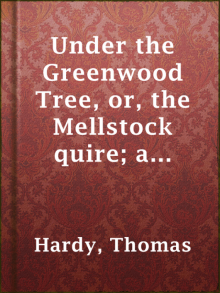 Under the Greenwood Tree; Or, The Mellstock Quire
Under the Greenwood Tree; Or, The Mellstock Quire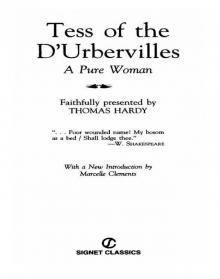 Tess of the D'Urbervilles
Tess of the D'Urbervilles Desperate Remedies
Desperate Remedies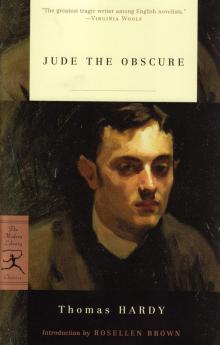 Jude the Obscure
Jude the Obscure Two on a Tower
Two on a Tower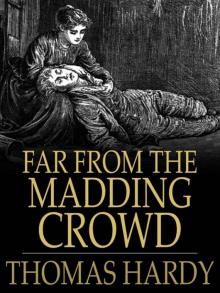 Far from the Madding Crowd
Far from the Madding Crowd The Return of the Native
The Return of the Native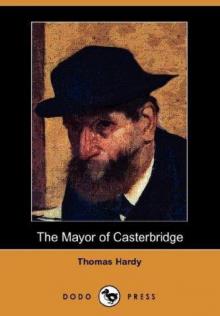 The Mayor of Casterbridge
The Mayor of Casterbridge The Well-Beloved
The Well-Beloved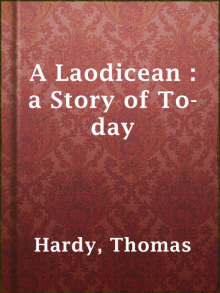 A Laodicean : A Story of To-day
A Laodicean : A Story of To-day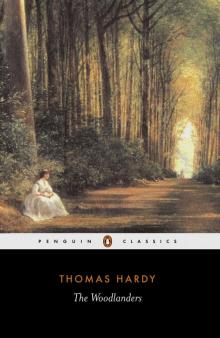 The Woodlanders
The Woodlanders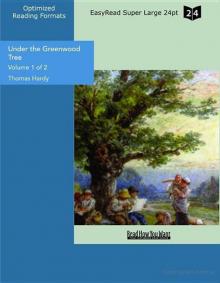 Under the Greenwood Tree
Under the Greenwood Tree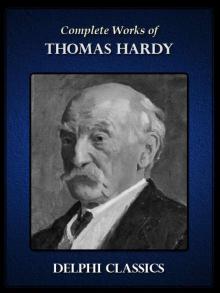 Complete Works of Thomas Hardy (Illustrated)
Complete Works of Thomas Hardy (Illustrated)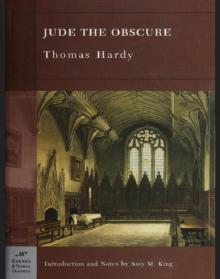 Jude the Obscure (Barnes & Noble Classics Series)
Jude the Obscure (Barnes & Noble Classics Series) The Distracted Preacher
The Distracted Preacher